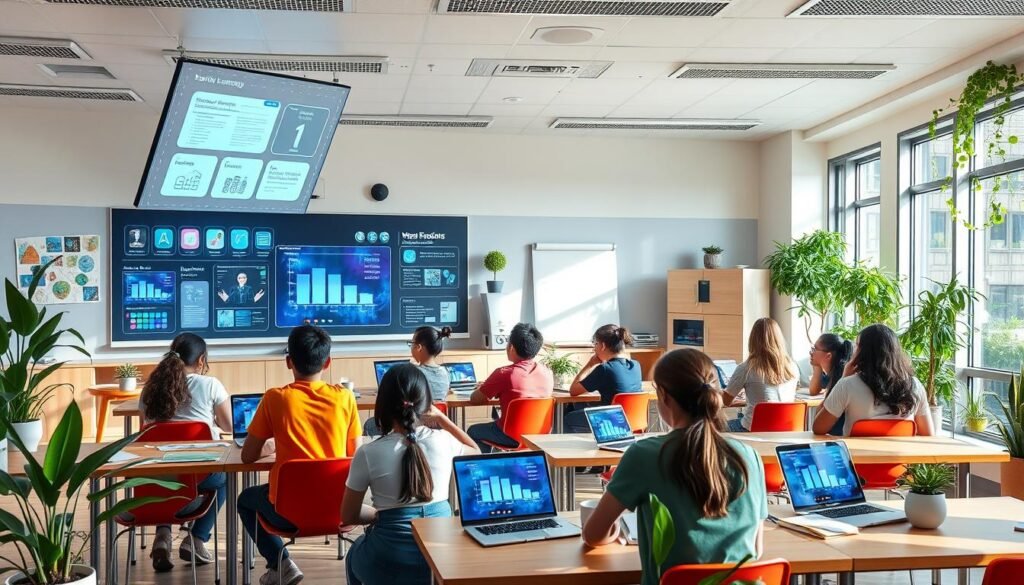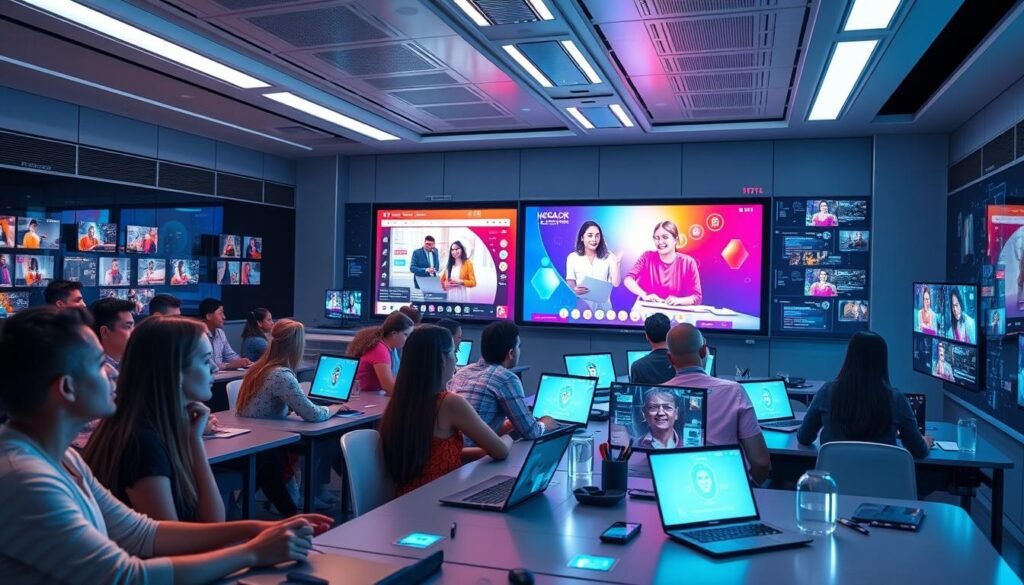The way we learn has changed a lot in the last few years. You don’t have to be in a classroom to learn anymore. Thanks to the internet and new tech, you can learn online anytime, anywhere.
Now, we’re in a new era of e-learning and online courses. This change is big and exciting.
A recent survey by Babson Survey Research Group found that over 30 percent of college students in the US take online courses. Online learning is great for anyone, whether you’re young or older. It’s a good way to improve your skills or learn something new.
Key Takeaways : The Future Of Education
- Over 30% of US higher education students take at least one distance course
- 90% of students believe online learning is the same or better than traditional classroom
- There are over 5,000 online programs available for various levels and disciplines
- Online education is more cost-effective with flexible payment options
- Online classes foster greater interaction with tutors in a personalized setting
The Rise of Online Education
ELearning has changed the face of education fast. Both schools and businesses love its flexibility and reach. A huge 78% think online learning will bring better education to more people. Also, companies see virtual learning making up 40% of their future learning plans, maybe even 90%.
Flexible Learning
Education has changed a lot. You don’t need to be in a classroom anymore. Thanks to the internet and new tech, you can learn anytime, anywhere with internet. This change lets people learn in a way that fits their life and goals.
Wide Selection of Programs
Online education has opened up many learning paths. You can find everything from top university courses to special skills training. This variety lets people pick what’s right for their career or interests, making learning more diverse and welcoming.
| Key Statistic | Percentage |
|---|---|
| Students classified as fully online learners in 2022 | Over 25% |
| Students taking at least some classes online | Over 50% |
| Students who prefer fully online or hybrid programs | Over 66% |
Online education has brought big changes to learning. It offers flexibility, wide access, and many choices. As tech keeps improving, education will keep getting more tailored and exciting, helping learners achieve their goals.
Benefits of Online Learning

Online education has changed the game for students and teachers. It offers accessibility like never before. Now, you can learn or teach from anywhere, without the hassle of commuting or strict schedules. This saves time and money, letting you use your resources better.
Online learning also means a customized learning experience. With smaller class sizes, you get more one-on-one time with your teacher. Plus, you have access to a wide range of materials like videos and eBooks. This makes learning dynamic and tailored to you.
- Virtual classrooms are available anywhere with an internet connection, enabling students to learn and educators to teach from the comfort of their own homes or while traveling.
- Online courses often utilize cost-effective digital resources, reducing the need for expensive textbooks and course materials.
- Online learning platforms offer tools for collaboration, such as message boards and group activities, enhancing the overall learning experience.
- Students in virtual classrooms receive immediate feedback on assignments, allowing for timely adjustments and a more effective learning process.
Online learning is becoming more popular because of its flexibility and personal touch. As technology keeps improving, online learning will play an even bigger role in education. It’s changing the way we learn, empowering people all over the world.
“Online learning opens up increased course variety options, allowing students to enroll in courses they are most interested in without the constraint of specific class times.”
The Future Of Education

Personalized Learning Experiences
Personalized learning is becoming a key focus in education’s future. The online education market is growing fast, thanks to VR, AR, and AI. These technologies help create learning experiences that fit each student’s needs and learning style.
Studies show that personalized learning can boost math skills by 50% compared to traditional teaching. The VR market in education is also growing quickly, with a 58% annual growth rate from 2019 to 2023. This is helping teachers use immersive experiences to make learning more engaging.
Mobile learning is also on the rise, with 57% of people preferring to learn on the go. This change makes education more flexible and convenient. It lets learners control their own learning pace and progress.
But, there are challenges ahead. While 80% of teachers see technology changing their role, 49% feel they’re not ready to use it. It’s important to help teachers use technology effectively to improve learning experiences.
The future of education looks bright and focused on individual needs. By using new technologies and promoting lifelong learning, we can prepare the next generation for a complex world.
“The majority of Americans believe that lifelong learning will become more important in the future.”
Conclusion
The future of online education looks very promising. The global online learning market is set to hit $325 billion by 2025. New tech like augmented reality (AR) and virtual reality (VR) will change how we learn.
Also, schools will focus more on skills like emotional intelligence and creativity. These skills are hard to automate.
Online learning has become more popular, thanks to the COVID-19 pandemic. It offers flexibility, accessibility, and personalized learning. These benefits have grown during the pandemic.
The education world is changing fast. New credentialing systems are emerging. This shift will make learning more diverse.
Even with all the tech advancements, it’s important to keep human touch in learning. The internet and digital tools are powerful. But, teachers and face-to-face interactions are still crucial.
By combining tech and human interaction, education can open up new doors. It will help students succeed in a changing job market.
Also Read : Revolutionizing Learning: The Role Of Technology In Modern Education
FAQs
Q: How is AI shaping the future of education?
A: AI is transforming the education landscape by providing personalized learning experiences, enhancing the learning environment, and supporting educators in their teaching methods. AI tools can analyze student performance and tailor educational content to meet individual needs, helping to prepare students with the skills and mindsets they’ll need for the workforce.
Q: What role do online courses play in the education system?
A: Online courses are a significant aspect of the modern education system, allowing learners to access a variety of educational experiences beyond the classroom. They provide flexibility and convenience, enabling students to learn at their own pace and fit their studies around other commitments.
Q: How can educators effectively teach and learn using technology?
A: Educators can effectively teach and learn using technology by integrating educational technology tools into their curriculum. This includes using platforms for online collaboration, implementing generative AI for personalized learning, and providing interactive content that engages students and enhances their educational experiences.
Q: What does the future of education look like with the integration of AI tools?
A: The future of education will likely see a greater reliance on AI tools like ChatGPT to facilitate learning. These tools can assist in automating administrative tasks, providing real-time feedback to students, and offering resources that cater to diverse learning styles, ultimately shaping the future of the education landscape.
Q: How does online learning prepare students for the workforce?
A: Online learning prepares students for the workforce by equipping them with essential skills such as self-discipline, time management, and digital literacy. These skills are crucial in today’s job market, where remote work and technology are increasingly prevalent.
Q: What trends in education should we expect in the coming years?
A: Trends in education likely include a continued emphasis on digital learning, the incorporation of AI in teaching methodologies, and a focus on personalized learning models. Additionally, there will be a push for education reform to ensure students acquire the necessary education and skills to thrive in a rapidly changing world.
Q: How can generative AI enhance the educational experience?
A: Generative AI can enhance the educational experience by creating interactive and adaptive learning materials that respond to students’ needs. This technology can help educators design more engaging lessons and provide instant support to students, fostering a more dynamic learning environment.
Q: What skills and mindsets will students need for the future?
A: Students will need a mix of technical skills, critical thinking abilities, and adaptability to succeed in the future. The education system must focus on developing these skills and mindsets through innovative teaching practices and the incorporation of technology in education.
Q: How will technology in education impact traditional teaching methods?
A: Technology in education will likely complement and transform traditional teaching methods rather than completely replace them. Educators can use technology to enhance classroom interactions, provide additional resources, and create a more engaging learning environment that meets the diverse needs of their students.
Q: What does the future of educational experiences look like?
A: The future of educational experiences will be characterized by more interactive, immersive, and personalized learning opportunities. With advancements in technology, students will be able to engage with content in new ways, collaborate with peers across the globe, and access resources that were previously unavailable, ultimately enriching their learning journey.
Source Links
- https://www.educations.com/articles-and-advice/5-reasons-online-learning-is-future-of-education-17146
- https://elearningindustry.com/elearning-and-the-future-of-education
- https://online.umn.edu/story/how-online-education-shaping-future-workforce
- https://moderncampus.com/blog/future-of-online-education.html
- https://drexel.edu/soe/resources/student-teaching/advice/benefits-of-online-and-virtual-learning/
- https://educationonline.ku.edu/community/teaching-online-is-the-future-of-education
- https://educationise.com/post/the-future-of-education-8-predictions-for-the-next-decade/
- https://www.ie.edu/insights/ideas-to-shape-the-future/idea/education-in-2050/
- https://medium.com/@aileenscott604/future-of-education-a-glimpse-into-the-next-20-years-5f7ef1314af5
- https://www.eschoolnews.com/digital-learning/2024/02/05/what-is-the-conclusion-of-artificial-intelligence-in-education/
- https://link.springer.com/chapter/10.1007/978-3-030-26068-2_14
- https://www.hoover.org/research/conclusions-how-improve-our-schools-post-covid-era


